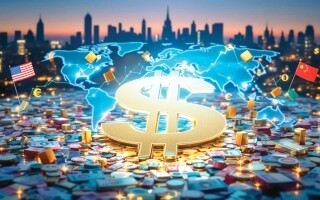
Many people in the country are expressing their concern over what appears to be an authoritarian turn in the United States, which has long been its model of democracy. As the United States faces the turmoil unleashed by the government of Donald Trump, many Chinese are realizing they can relate to what many Americans are experiencing. They say it feels similar to the Cultural Revolution, a period known as 'the decade of turmoil.'
Despite official restrictions, lawyers, journalists, and entrepreneurs built an emerging civil society that sought to hold the government accountable. These are the Chinese who suffered the most when Xi stifled efforts to make China a more open and democratic society, and they are also the most disappointed by what is happening in the United States. They have been surprised by the abrupt changes in U.S. policy under Trump's presidency.
Chinese who share these values sometimes used the comment sections of the account to vent about their own government. They express their alarm in interviews, articles, and social media comments that range from disappointment and anger to sarcasm. 'Beacon of democracy, 1776-2025,' wrote a commenter on a post from the U.S. Embassy's official Weibo account in China.
They are witnessing things they thought could only happen in China: flattering official announcements, media intimidation, and prominent entrepreneurs competing for the favor of leaders, not to mention a president who calls himself king. 'I am overwhelmed by a sense of familiarity: it looks so much like China,' said Zhang Wenmin, an investigative journalist known by her pen name, Jiang Xue.
To some Chinese, the young aides that Elon Musk has sent to dismantle the U.S. government remind them of the Red Guards that Mao Zedong recruited to destroy the bureaucracy at the height of the Cultural Revolution. The tone, people say, sounds like messaging from the Chinese Communist Party. 'Not even the messages from the CCP embassy, with all their propaganda, spend every day obsessively praising Xi Jinping,' wrote Deng Haiyan, a former police officer turned government critic, on X.
The official Weibo account of the U.S. embassy in China, which has 3.5 million followers, used to be a platform for the U.S. government to spread American values and reliable information. Another commenter wrote: 'Just like North Korea and its friend,' referring to China. In a comment about an episode of my Chinese podcast, a YouTube viewer wrote a parody of a White House announcement in the style of CCP propaganda.
The U.S. system is tearing itself apart without any outside pressure, he said, and this is similar to what the Communist Party did at the height of the Cultural Revolution in 1966. After the Cultural Revolution, which destroyed almost all of China's institutions, the country tried to build something resembling those American foundations. 'We also know that the Cultural Revolution consisted of dismantling institutions to widen control.' For these Chinese, who strive for democratic values but face an authoritarian state, their model of emulation is self-destructing.
Li Yuan writes the column 'The New New World,' which focuses on China's growing influence in the world by examining its companies, politics, and society. Now, for some Chinese, the United States is looking more and more like China. 'Coming from an authoritarian state, we know that dictatorship is not just a system: it is, at its core, the pursuit of power,' wrote Wang Jian, a journalist, in a post on X that criticized Trump. The Weibo account was intended to be a bulletin of announcements in Chinese about American values. In the past month, many of the embassy's posts on Weibo, overlapping with some of those on its account on X, were flooded with angry comments from Chinese users expressing their disappointment. 'What a shame!' many Weibo users with IP addresses in China commented on posts about U.S. policy toward Ukraine. In a comment about Trump's statements on human rights, a user wrote: 'And you think you are worthy to talk about human rights? Millions of Chinese died during the Cultural Revolution and tens of millions were persecuted. What is happening in the United States is far from that.
The embassy's press office declined to comment. For many Chinese, the chaos in Washington stems from a well-known impulse. 'The only way to dismantle the U.S. 'deep state' is through a 'Cultural Revolution',' wrote Zhang Qianfan, a law professor at Peking University, in a widely circulated article on the erosion of American democracy. 'You have betrayed Ukraine.' The changes in both content and style on the Weibo account led one commenter to mock the social media editor of the account: 'Blink twice if you've been kidnapped.' Nicholas Burns, who was the U.S. ambassador to China until January, spoke about the importance of using social media to engage with the Chinese public. 'But historical parallels are never exact because history really doesn’t repeat itself.'
The most surprising thing is the language that government agencies have used in their social media posts. 'I think I really underestimated the dark side of human nature,' he wrote on Weibo. 'The rhythm of these applause feels very familiar to me,' commented a lawyer on the post by Li.














